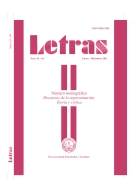Por favor, use este identificador para citar o enlazar este ítem:
https://repositorio.uca.edu.ar/handle/123456789/3807| Título: | “Ilimitar” la voz y el lenguaje : Evguenii Oniéguin: novela en versos y en música | Autor: | D’Angelo, Biagio | Palabras clave: | NOVELA RUSA; LITERATURA RUSA; ESTUDIO COMPARATIVO; OPERA; Pushkin, Aleksandr Sergeevich, 1799-1837; Tchaikovski, Pyotr, 1840-1893 | Fecha de publicación: | 2011 | Editorial: | Universidad Católica Argentina. Facultad de Filosofía y Letras | Cita: | D'Amgelo, Biagio. “”Ilimitar” la voz y el lenguaje. Evguenii Oniéguin: novela en versos y en música” [en línea]. Letras, 63-64 (2011). Disponible en: https://repositorio.uca.edu.ar/handle/123456789/3807 | Resumen: | Resumen: Este ensayo pretende comparar la novela de Pushkin, Evguenii Oniéguin, y la versión operística realizada por el compositor ruso Piotr Ilich Tchaikovski. Nos interesa, en modo particular, la presencia de la voz, ya que ella, en el libreto operístico, asume una entonación particular que, con sugerente precisión, ha sido definida “una oralidad transferida”. Hablar del sistema de relación entre ópera y texto literario significa recargar de potencialidades intersemióticas los códigos musicales y literario-textuales. Massimo Mila ha definido el estudio de este polisistema con el término de “libretología”, porque, desde el punto de vista de la comparación literaria, el “mediador” entre el texto escrito y su voz, verdadera traducción de un sistema semiótico a otro, es el libreto de ópera. Nos preguntaremos, finalmente, si, entre literatura y música, no debería, más bien, tratarse de una incomparabilidad. Abstract: This paper aims to compare the novel Evguenii Onegin, by Pushkin, and its operatic version, composed by Piotr Ilich Tchaikovsky. We are interested, in a particular way, in the presence of the voice, as it assumes a particular intonation in the operatic libretto, that has been defined, with evocative precision, as “an transferred orality”. Talking about the system of relations between opera and literary text means to recharge with intersemiotic potentialities the musical code and the literary text as well. Massimo Mila has defined the study of this polysystem by the term “librettology” because, from the point of view of literary comparison, the “mediator” between the written text and the voice, the real translation of a semiotic system to another one, is the libretto. We ask, finally, wether we should not rather talk about an incomparability between literature and music. |
URI: | https://repositorio.uca.edu.ar/handle/123456789/3807 | ISSN: | 0326-3363 | Disciplina: | LITERATURA | Derechos: | Acceso Abierto |
| Aparece en las colecciones: | LETRAS - 2011 nro. 63-64 |
Ficheros en este ítem:
| Fichero | Descripción | Tamaño | Formato | |
|---|---|---|---|---|
| ilimitar-voz-lenguaje-evguenii-onieguin.pdf | 211,63 kB | Adobe PDF |  Visualizar/Abrir |
Visualizaciones de página(s)
206
comprobado en 30-abr-2024
Descarga(s)
82
comprobado en 30-abr-2024
Google ScholarTM
Ver en Google Scholar
Este ítem está sujeto a una Licencia Creative Commons

